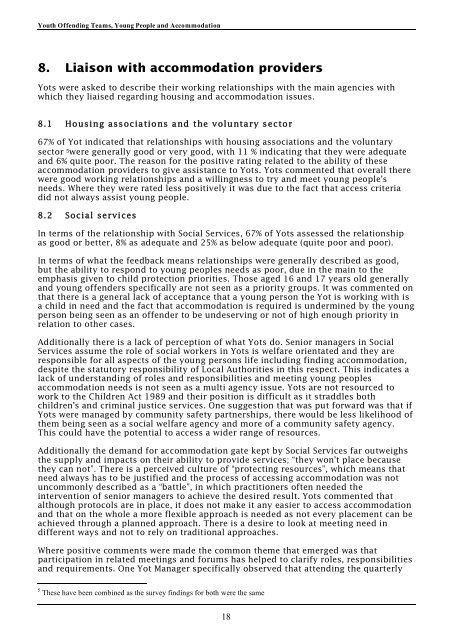Youth offending teams, young people and accommodation - Nacro
Youth offending teams, young people and accommodation - Nacro
Youth offending teams, young people and accommodation - Nacro
Create successful ePaper yourself
Turn your PDF publications into a flip-book with our unique Google optimized e-Paper software.
<strong>Youth</strong> Offending Teams, Young People <strong>and</strong> Accommodation<br />
8. Liaison with <strong>accommodation</strong> providers<br />
Yots were asked to describe their working relationships with the main agencies with<br />
which they liaised regarding housing <strong>and</strong> <strong>accommodation</strong> issues.<br />
8.1 Housing associations <strong>and</strong> the voluntary sector<br />
67% of Yot indicated that relationships with housing associations <strong>and</strong> the voluntary<br />
sector 5were generally good or very good, with 11 % indicating that they were adequate<br />
<strong>and</strong> 6% quite poor. The reason for the positive rating related to the ability of these<br />
<strong>accommodation</strong> providers to give assistance to Yots. Yots commented that overall there<br />
were good working relationships <strong>and</strong> a willingness to try <strong>and</strong> meet <strong>young</strong> <strong>people</strong>’s<br />
needs. Where they were rated less positively it was due to the fact that access criteria<br />
did not always assist <strong>young</strong> <strong>people</strong>.<br />
8.2 Social services<br />
In terms of the relationship with Social Services, 67% of Yots assessed the relationship<br />
as good or better, 8% as adequate <strong>and</strong> 25% as below adequate (quite poor <strong>and</strong> poor).<br />
In terms of what the feedback means relationships were generally described as good,<br />
but the ability to respond to <strong>young</strong> <strong>people</strong>s needs as poor, due in the main to the<br />
emphasis given to child protection priorities. Those aged 16 <strong>and</strong> 17 years old generally<br />
<strong>and</strong> <strong>young</strong> offenders specifically are not seen as a priority groups. It was commented on<br />
that there is a general lack of acceptance that a <strong>young</strong> person the Yot is working with is<br />
a child in need <strong>and</strong> the fact that <strong>accommodation</strong> is required is undermined by the <strong>young</strong><br />
person being seen as an offender to be undeserving or not of high enough priority in<br />
relation to other cases.<br />
Additionally there is a lack of perception of what Yots do. Senior managers in Social<br />
Services assume the role of social workers in Yots is welfare orientated <strong>and</strong> they are<br />
responsible for all aspects of the <strong>young</strong> persons life including finding <strong>accommodation</strong>,<br />
despite the statutory responsibility of Local Authorities in this respect. This indicates a<br />
lack of underst<strong>and</strong>ing of roles <strong>and</strong> responsibilities <strong>and</strong> meeting <strong>young</strong> <strong>people</strong>s<br />
<strong>accommodation</strong> needs is not seen as a multi agency issue. Yots are not resourced to<br />
work to the Children Act 1989 <strong>and</strong> their position is difficult as it straddles both<br />
children’s <strong>and</strong> criminal justice services. One suggestion that was put forward was that if<br />
Yots were managed by community safety partnerships, there would be less likelihood of<br />
them being seen as a social welfare agency <strong>and</strong> more of a community safety agency.<br />
This could have the potential to access a wider range of resources.<br />
Additionally the dem<strong>and</strong> for <strong>accommodation</strong> gate kept by Social Services far outweighs<br />
the supply <strong>and</strong> impacts on their ability to provide services; “they won’t place because<br />
they can not”. There is a perceived culture of “protecting resources”, which means that<br />
need always has to be justified <strong>and</strong> the process of accessing <strong>accommodation</strong> was not<br />
uncommonly described as a “battle”, in which practitioners often needed the<br />
intervention of senior managers to achieve the desired result. Yots commented that<br />
although protocols are in place, it does not make it any easier to access <strong>accommodation</strong><br />
<strong>and</strong> that on the whole a more flexible approach is needed as not every placement can be<br />
achieved through a planned approach. There is a desire to look at meeting need in<br />
different ways <strong>and</strong> not to rely on traditional approaches.<br />
Where positive comments were made the common theme that emerged was that<br />
participation in related meetings <strong>and</strong> forums has helped to clarify roles, responsibilities<br />
<strong>and</strong> requirements. One Yot Manager specifically observed that attending the quarterly<br />
5 These have been combined as the survey findings for both were the same<br />
18

















